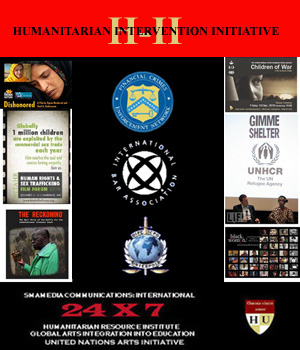21 February 2012
Contact:
Stephen M. Apatow
Founder,
Director of Research & Development
Humanitarian
Resource Institute (UN:NGO:DESA)
Humanitarian University
Consortium Graduate Studies
Center
for Medicine, Veterinary Medicine & Law
Phone:
203-668-0282
Email:
s.m.apatow@humanitarian.net
Internet:
www.humanitarian.net
HRI:UNArts:
Humanitarian Intervention Initiative
Url:
www.unarts.org/H-II
OPSEC
Url:
www.H-II.org

OPSEC: Oil and Terrorism - Prices Transform Oil into a Weapon
The
terrorist attack exploits systemic vulnerabilities in world
markets. [1] Through the use of the media, hedge funds and
investment
banks drive speculative trading in oil/food commodities. [2,3]
The
result is spikes in infrastructure critical commodities with
catastrophic humanitarian damage on the grassroots level, impacting
entire continents.
Iran
warned Britain and the US yesterday that the international community
could face a new oil crisis if the United Nations security council
imposes sanctions on Tehran over its alleged attempt to acquire a
nuclear weapons-making capability. Speaking in Tehran, Ali Larijani,
the country's chief nuclear negotiator and head of the supreme national
security council, said Iran would be reluctant to cut its oil exports.
"We do not want to use the oil weapon. It is them who would impose it
upon us." But Mr Larijani added that if the west did decide on
sanctions, "we will react in a way that would be painful for them ...
Do not force us to do something that will make people shiver in the
cold." -- Iran
threatens to use 'oil weapon' in nuclear standoff: The UK Guardian, 6
August 2006.
"Banning
the tiny quantities of exports to the UK and France involves very
little risk for Iran - indeed quite the opposite, it catches the
headlines and leads to a higher global oil price, which is something
Iran is very keen to encourage," said Caroline Bain, analyst at the
Economist Intelligence Unit.... Hedge funds have also boosted their
bullish bets on oil to the highest since May, according to regulatory
data. Brent crude rallied as high as $121.15 a barrel during the thinly
traded day, but later pared gains as traders reckoned that Iran's
retaliatory ban on shipments to the UK and France had more political
than practical impact. -- Oil
rises to 8-month high on Iran, China move: Euronews, 20
February 2012.
Brent
crude rose to about $119 a barrel on the ICE Futures Europe exchange in
London today, and is up about 12 percent this year, boosted by concern
that the Islamic republic may block the strait. About 20 percent of
global crude supplies flow through the 34-kilometer-wide (21-mile wide)
waterway. --
World
faces worst oil risk since 1970s, Deutsche Bank says: Bloomberg, 15
February 2012.
Related:
Discussions
References
- HRI: International Disaster
Information Network: Economic Emergency Discussions.
- H-II Appeal to Nobel Laureates
-
HRI: Humanitarian University Consortium: Humanitarian Resource
Institute, 9
July 2011. Confronting an International Economic/Humanitarian
Emergency..
-
###
|